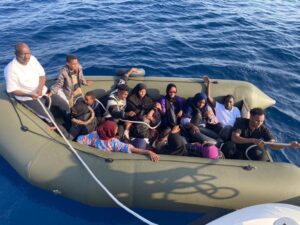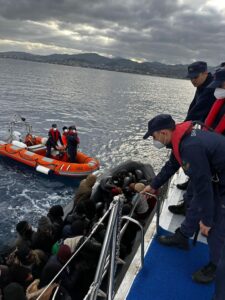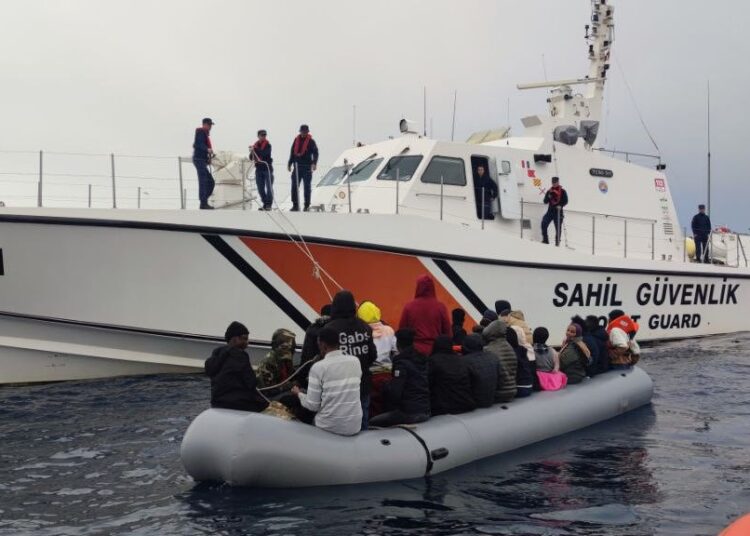Abdullah Bozkurt/Stockholm
Turkey’s Supreme Court of Appeals has inadvertently opened a legal pathway that could expose whether the National Intelligence Organization (MIT) played a role in “weaponizing” migration against Cyprus, an allegation long voiced by Nicosia and critics of Ankara’s eastern Mediterranean policy.
In a ruling issued in May, the high court partially upheld prison sentences stemming from a deadly 2018 migrant-smuggling voyage in the eastern Mediterranean while sending key parts of the case back to the trial court. The remand orders a deeper inquiry into whether the killings and the smuggling were committed within the activities of an organized criminal network, an angle the justices said investigators and the lower court had failed to properly explore.
The case originated with a July 18, 2018, incident, when Turkish Coast Guard units received a distress call about a migrant boat carrying roughly 150 people taking on water some 30 kilometers off northern Cyprus. Prosecutors say smugglers had recruited mostly Syrian nationals seeking passage to the island’s southern, Greek-Cypriot-administered side, charging $2,000–$2,500 per person.
The migrants were moved by vehicle to a remote coastal location near a tunnel in Turkey’s southern Mersin province, then loaded onto a vessel that later foundered in the open sea. Nineteen people died including two women (one 28 weeks’ pregnant), while 102 migrants were rescued. The case was tried by the Silifke 1st High Criminal Court.
The ruling by Turkey’s Supreme Court of Appeals mentioned confidential informants who provided detailed accounts of how migrant smuggling from Turkey to Cyprus was carried out:
On November 17, 2022, the Silifke court issued several convictions on charges including migrant smuggling and, in one instance, murder. On appeal the Supreme Court of Appeals upheld several of those convictions but quashed others, finding that the trial court had not fully examined whether the acts were committed as part of a profit-driven criminal organization or sufficiently mapped the links among defendants, issues that, if proven, could trigger aggravated liability. Those parts were sent back to Silifke for further investigation and a new decision.
A statistical backdrop underscores why the migration matters for Cyprus. Since 2016 asylum applications in Cyprus had risen sharply from 2,871 to 7,761 by 2018, already making the island the EU leader per capita. They jumped to about 13,000 in 2019, dipped to 6,651 in 2020, the year of the pandemic, then rebounded to around 13,235 in 2021.
Applications peaked at 20,593 in 2022 before dropping to 11,617 in 2023 and about 8,664 in 2024. So far in 2025 they remain below the 2022 peak, but Cyprus continues to record one of the highest per capita rates of arriving migrants in the EU. Many migrants use Turkey as a transit point to arrive in Cyprus, by either sea or air through Turkey-controlled northern Cyprus.
The high court also flagged a pivotal omission: the lower court’s failure to examine statements from two confidential informants who had provided early, detailed information about the smuggling network. The ruling instructs the trial court to identify those informants, hear their testimony and assess their credibility and relevance to the organized-crime question, as well as to revisit whether the facts support murder rather than mere negligence and whether the offense falls into an organized criminal activity.

According to the case file, a Turkish man on August 1, 2018 and a Syrian man on September 17, 2018 gave statements to officers from the Provincial Gendarmerie Command’s Anti-Smuggling and Organized Crime Branch Directorate in Adana. Their identities were kept secret. Given their status and timing, they were likely working as informants for MIT, Turkey’s main intelligence service — an implication the trial court never tested because it neither identified nor called them as witnesses. Investigators, too, failed to follow up on the leads the pair supplied about the network’s structure, leadership and years-long operations.
Whether the Silifke court will now summon the two informants or instead insist their testimony would not affect the convictions and sentences remains to be seen.
There is also a political-judicial wrinkle: Should the bench press ahead in identifying and hearing the informants, the Supreme Court of Appeals could still step back if judges conclude the process risks implicating MIT. T
The remand does not directly incriminate the intelligence service, but it compels the courts to map hierarchy, profits, linkages and protection — precisely the vectors that critics say overlap with intelligence-linked facilitators. By ordering findings on who founded the group, how it profited and how the defendants were connected, the justices have obliged investigators to trace command, finance, logistics and protection, the same axes on which Cypriot officials have long alleged state-linked facilitation occurs.

Cyprus has for years alleged that Ankara tolerates and at times encourages smuggling pipelines to push migrants toward the Republic of Cyprus/EU as political leverage in disputes with Nicosia. The doomed 2018 voyage was not a one-off but rather part of a systemic pipeline that has operated for years via Turkey and Turkish-controlled northern Cyprus.
Turkey denies any claim of state involvement, insisting that it combats smuggling and rescues lives at sea and that irregular migration is a transnational criminal problem, not a tool of statecraft.
Skeptics doubt that the tug-of-war between the appellate and trial courts will yield a robust outcome, given the political sensitivities and the potential exposure of state actors. They argue that a judiciary under the firm control of the government of President Recep Tayyip Erdogan is unlikely to allow a case to evolve into a de facto inquiry touching MIT and that the system will ultimately find a way to sweep this inadvertent exposure under the rug.
Even so, the record already shows enough friction — over basic investigative steps, evidentiary omissions and the organized-crime dimension — to offer a rare glimpse of how state actors may intersect with organized migrant-smuggling networks.
The presence of confidential informants and assets embedded in such networks, and their potential to steer flows toward specific targets — here, Cyprus — now sits at the heart of a court-ordered fact-finding mission.
While the case may not prove a legal milestone for testing in court the allegations that have long unsettled eastern Mediterranean politics, it has already lent further weight to claims of Turkish intelligence involvement in weaponizing migration for political purposes.












